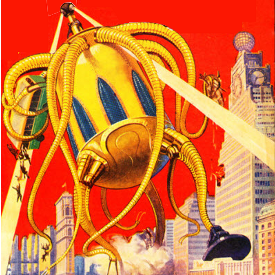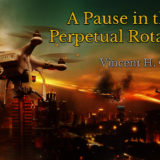Kim Stanley Robinson published a major buzzkill on BoingBoing this week, essentially declaring that all of us science fiction nerds ought to give up on our dreams of visiting other stars (colonizing the galaxy…galactic empire…space marines…space pirates…discoveries of long dead highly advanced alien civilizations…discoveries of technological alien civilizations that want to be our friends…or eat us…incomprehensible artifacts…intriguingly bizarre ecosystems…) and instead focus our attentions on Earth and solar system centric futures.
There’s been a fair amount of pushback on this (we do love our space pirates after all), with the primary arguments being that –
KSR is being too pessimistic
KSR is making the cliched mistake of assuming that future technological growth won’t include unforseen breakthrus
KSR is not projecting far enough into the future
Those may all be true, but I have one other “mistake” to add to his thoughtful but bitter article:
KSR is making the mistake of trying to predict what will NOT happen in the future, as opposed to trying to predict what WILL happen in the future.
Don’t be distracted by the back-and-forth of whether or not science fiction is actually predictive (some say it’s not but is instead reflective of our own times, while the folks who established the genre are on record as stating – over and over – that they’re in the business of prognostication, including Bradbury’s corollary that SF is about warning us what to avoid. I side with Ike and Art and Ray) because in this case it doesn’t really matter.
When you make guesses – rigorous or not – about what is going to happen in the future, your predictions are given wide latitude due to our mental affinity for making connections. Star Trek’s communicator predicted the cell phone. No, not really. Flip phones (gone the way of the dinosaur) were inspired by the communicator, but no one carried them around aboard ship. They were basically surface-to-orbit walkie-talkies, a technology that was well-established by the time Trek aired in the 60s.
But people persist in holding this out as one of many examples in which science fiction predicted the future.
Those who predict what will happen also benefit from our propensity to remember the hits and forget about the misses (another aspect of the same evolutionary characteristic). All those aliens who paid us a visit in times gone past? Forgotten – except in re-runs.
On the other hand, if you try to tell us what isn’t going to happen – especially if a lot of people want to see that thing happen – any hint that you were wrong is going to be used to dismiss everything that you predicted.
What’s more, people are going to be motivated to “show you” that you were wrong.
You can’t circumnavigate the globe – you’ll fall off the edge. Heavier than air flight is physically impossible. Man will never walk on the Moon.
There will never be a third season of Star Trek.











3 Comments